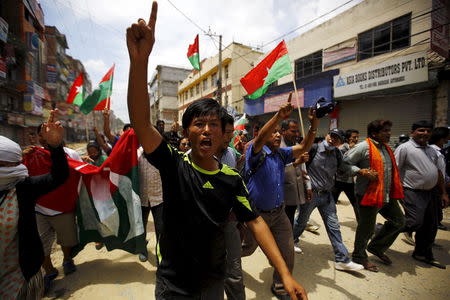Nepal says will not let protests derail constitution

By Gopal Sharma KATHMANDU (Reuters) - Nepal's government has vowed that protests in which 14 people have been killed will not derail a constitutional process that is in the final stretch, even though pressing ahead could further anger ethnic minority groups on the southern plains. In the most serious incident, nine people were killed this week when protesters attacked a police post in the far southwest of the poor Himalayan state, which lies sandwiched between India to the south and China to the north. The government deployed the army to restore order following the protests by members of a minority group called the Tharus. Together with another group of plains people, the Madhesis, they demand autonomy under plans to turn Nepal into a federation. "I don't see any possibility for the process to stop," Law Minister Narahari Acharya told Reuters. Nepal, which emerged from a civil war in 2006, has all but completed work on a permanent charter that would carve the country of 28 million people into seven federal provinces. The Tharus, a group that numbers about 1.7 million, want a separate eighth province - but their demands have been rebuffed as unworkable by the government. A great deal is at stake for the country. Adoption of the constitution, which requires a two-thirds majority in parliament, would start a transformation in which a new president, prime minister and speaker would be chosen. PLAINS "SIMMERING" Prime Minister Sushil Koirala has invited protest leaders to Kathmandu for talks, but they refuse to attend unless a curfew is lifted and 15 arrested activists - some charged with murder - are released. "Without this we will not go for talks," said Ram Janam Chaudhari, who leads a caucus of Tharu lawmakers. The escalation led one government leader to accuse India of instigating the protests. That prompted a rare intervention by Indian Prime Minister Narendra Modi, who urged Nepal to make the constitutional process more inclusive. Ashok Mehta, a retired Indian army general and expert on Nepal, dismissed the accusation of meddling but urged that the protesters' demands be addressed - including for an eighth state. "The plains are simmering," Mehta told Reuters. "There is a need for a pause to take on board the concerns of the plains people." Bishnu Raj Upreti, head of the Nepal Centre for Contemporary Research, said the frustrations of marginal communities had been exploited by politicians who oppose the constitution and want to "create trouble". "The government should reach out to the people at local, constituency level," he said. "This will help ease the tension. Otherwise the feeling of injustice will be cemented further." (Additional reporting and writing by Douglas Busvine; Editing by Robert Birsel)

 Yahoo News
Yahoo News 